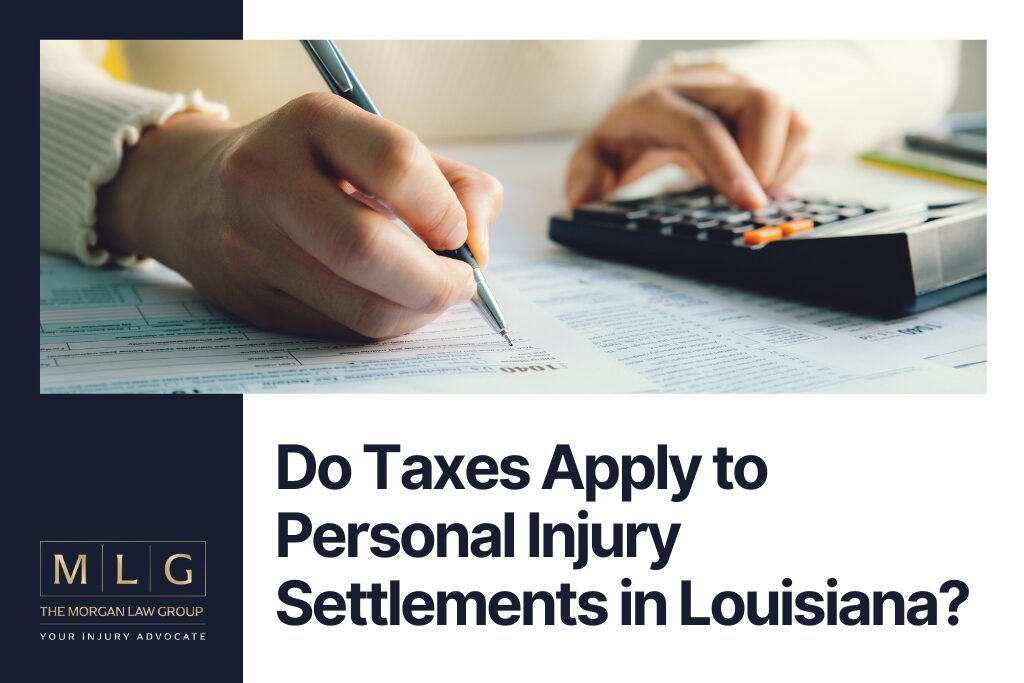When you receive a personal injury settlement, you may wonder whether a portion of it will be taxed. In Louisiana, understanding the tax implications of a personal injury settlement can be complex, especially given the emotional and financial strain already present in these cases.
Have an in-depth understanding of whether taxes apply to personal injury settlements in Louisiana. At The Morgan Law Group, our personal injury attorneys in Louisiana guide victims through the nuances of personal injury claims, ensuring they understand every aspect of their settlement, including its taxability.
Average Personal Injury Settlements in Louisiana
The value of personal injury settlements in Louisiana varies significantly depending on the specifics of the case. Settlements are determined based on several factors, including the severity of the injury, medical expenses, lost wages, pain and suffering, and any future damages you may endure. In Louisiana, an average settlement might range from several thousand dollars to several hundred thousand, depending on the circumstances.
For instance, cases involving serious injuries, such as traumatic brain injuries or spinal cord injuries, generally yield higher settlements. Likewise, if a settlement involves a clear instance of negligence, the value might increase. However, every personal injury case is unique, making it essential to work with an experienced personal injury attorney in Louisiana who can evaluate your situation and fight for maximum compensation.
After receiving a settlement, one of the most common concerns is whether a portion of it is taxable. Understanding which parts of your settlement are subject to taxation can help you avoid surprises during tax season.
NonTaxable Personal Injury Settlements in Louisiana
For injured individuals, a significant portion of personal injury settlements is nontaxable. According to the Internal Revenue Code Section 104(a)(2), compensation received as part of a personal injury or physical sickness settlement is generally not subject to federal income tax.
This tax exemption includes compensation for:
- Medical Expenses: Any part of your settlement intended to cover past, present, or future medical expenses is nontaxable. Whether it covers doctor visits, surgeries, rehabilitation, or prescription medication, you will not owe taxes on these funds.
- Pain and Suffering: Those who receive compensation for physical pain and emotional suffering caused by an injury are generally not required to pay taxes on this portion of the settlement. This applies to both physical pain and emotional anguish directly related to your physical injuries.
- Lost Wages Due to Physical Injury: Typically, lost wages that are a part of a personal injury settlement due to time missed from work because of an injury are also exempt from taxation. This tax exemption applies because the compensation is directly linked to an injury.
- Permanent Disability or Disfigurement: Any award you receive for permanent disability, scarring, or disfigurement is not subject to taxation in Louisiana. This exemption exists to ensure that you are properly compensated for losses impacting your quality of life without the burden of a tax obligation.
Overall, nontaxable personal injury settlements provide significant financial relief without the burden of additional taxes, ensuring that injured individuals receive the full benefit of their compensation.
Taxable Personal Injury Settlements in Louisiana
While most components of a personal injury settlement are nontaxable, there are instances where certain parts of the compensation may be subject to taxation. It’s essential to understand which parts of your settlement might trigger a tax liability to prepare accordingly.
- Interest Earned on the Settlement: If your settlement includes interest, whether due to a delay in the payment or an accrual over time, this interest is subject to taxation. This is because interest income is considered a form of taxable income by the IRS.
- Punitive Damages: In some cases, courts may award punitive damages. Punitive damages are designed to punish the at-fault party for especially reckless or negligent behavior. Unlike compensatory damages, which are intended to make you whole, punitive damages are taxable under federal law.
- Emotional Distress Not Related to Physical Injury: Compensation for emotional distress or mental anguish is typically nontaxable if directly related to a physical injury. However, if you receive a settlement for emotional distress that is unrelated to physical harm – for instance, psychological trauma without any physical injury – then that portion may be taxable.
- Previously Deducted Medical Expenses: If you previously deducted medical expenses on your tax return and later received a settlement covering those same costs, that portion of your settlement will be considered taxable. T
To determine which parts of your personal injury settlement may be taxable, it’s important to speak with a personal injury attorney in Louisiana who is familiar with personal injury and tax laws.
Consult Our Louisiana Personal Injury Attorneys
Navigating the tax implications of a personal injury settlement in Louisiana can be challenging. At The Morgan Law Group, we understand the challenges that injured individuals face when dealing with the aftermath of an accident.
From recovering physically to managing finances and determining tax liabilities, the road to recovery can be difficult. Our experienced Louisiana personal injury attorneys are here to help you understand every aspect of your settlement, including tax implications, and to guide you every step of the way. We are committed to securing fair compensation for our clients, ensuring that you receive the settlement you deserve without unexpected tax burdens.
If you have questions about your personal injury settlement, need assistance with your personal injury claim, or simply want to understand your rights, do not hesitate to reach out to our injury attorneys. Call us at (504) 499-5613 or complete our online form and have your free consultation.

